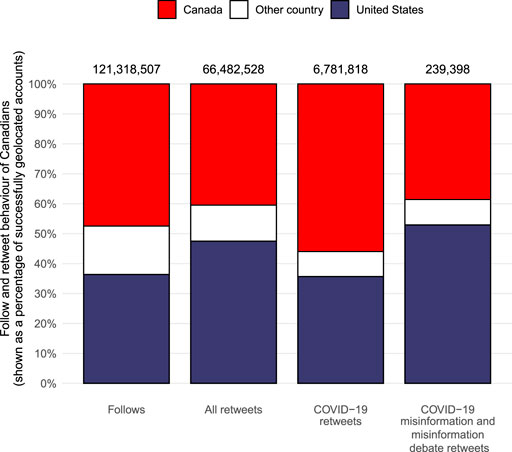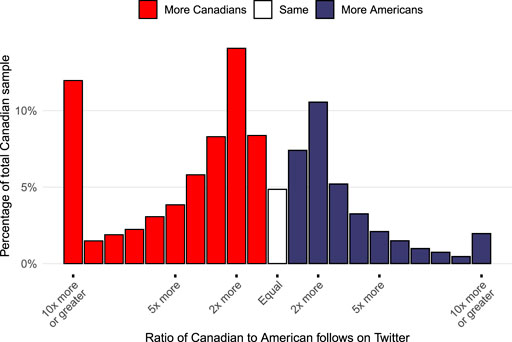Infodemic Pathways: Evaluating the Role That Traditional and Social Media Play in Cross-National Information Transfer
- 1Department of Political Science, McGill University, Montreal, QC, Canada
- 2Department of Political Science, University of Toronto, Toronto, ON, Canada
- 3Department of Computer Science, McGill University, Montreal, QC, Canada
- 4Max Bell School of Public Policy, McGill University, Montreal, QC, Canada
A Corrigendum on
Infodemic Pathways: Evaluating the Role that Traditional and Social Media Play in Cross-National Information Transfer
by Bridgman, A., Merkley, E., Zhilin, O., Loewen, P. J., Owen, T., and Ruths, D. (2021). Front. Polit. Sci. 10:648646. doi: 10.3389/fpos.2021.648646
This corrigendum concerns a data error discovered while working on an extension of the Infodemic pathways paper. A large number of Canadian and American Twitter users were excluded from the set of users where additional location data was collected. As location data was not available for these users, any follow or retweet relationships to them were not computed and included in the paper’s analysis. The net result was an incorrect estimation of the number of follow and retweet relationships exhibited by the Canadian Twitter users examined. This corrigendum corrects these data errors and reproduces the relevant analyses. Notably, we find that Canadians actually follow more Canadian accounts than American ones and have a preference for domestic COVID-19 information.
However, the original findings of the paper concerning the significant role that U.S.-based COVID-19 misinformation plays in the Canadian information ecosystem are strengthened by the corrected data. Specifically, while Canadians follow more Canadian accounts and retweet more COVID-19 specific Canadian content, a majority of the misinformation tweets retweeted by Canadian accounts that could be geolocated come from U.S.-based accounts. Moreover, following U.S.-based accounts continues to be associated with a greater likelihood to produce original content that contains misinformation. These updated results more clearly highlight that the U.S. is a source of misinformation for reasons that go beyond population size and Canadians’ general proclivity for U.S.-based information. The U.S. does not only play a significant role—it is the dominant source of Twitter-based COVID-19 misinformation for Canadians.
Correction
To fix the error, we started from the full follower network and collected information for every account that was excluded from the original collection. A small number of accounts could not be retrieved from the Twitter API in either the original or secondary pull due to deletion or privacy settings (representing 1.5% of total accounts queried). We then recalculated the geographic network of follows for each individual user in the sample. We also recalculated retweet and tweet behavior with the complete dataset of location data of all those whose content was retweeted/were followed.
Across the 187,225 English-language Canadian accounts with publicly available follower data examined here, Canadians follow a median of 148 Canadian accounts, 89 accounts from the United States, and 27 accounts from other countries. Approximately 47% of follows that can be geolocated were identified as Canadian, while 36% were based in the United States. See the updated Figure 2, which shows that only 34% of Canadians follow more Americans than Canadians on Twitter.
In addition to Canadians following many American accounts, they also retweet a large volume of material from the United States. See the updated Figure 3.1,2 Across all geolocated retweets from Canadian accounts, a full 47% are cascading U.S.-based content (only 40% are Canadian-Canadian retweets, despite the larger followership). For COVID-19 related information, Canadians are far more likely to retweet Canadian accounts (56% of overall volume) and are comparatively less likely to retweet U.S.-based content (36% of overall volume). Thus, there is a relative preference for local health information as compared to all information (a result largely driven by retweeting of political and health leadership across the country). Canadians, while also interested in COVID-19 information coming from the United States, are comparatively less likely to retweet that content as compared to all content. Most importantly, and despite a large interest in Canadian-based COVID-19 information, Canadians are also far more likely to retweet U.S.-based COVID-19 misinformation. When Canadians retweet a tweet containing misinformation or about the misinformation debate, it is from a U.S.-based account 53% of the time (Canada-based accounts represent only 39% of volume)—a percentage far higher than content regardless of topic and COVID-19 specific information.

FIGURE 3. Proportion of follows and retweets for Canadian Twitter users highlighting U.S.-orientation with total number of follow relationships and retweets above the bars.
Canadians engage heavily with U.S.-based accounts—far more than those from other countries. They also retweet content and particularly COVID-19 misinformation coming from U.S. accounts at rates higher than their followership behavior would suggest. However, Canadians do express a preference for domestic COVID-19 content that does not contain misinformation keywords.
To evaluate the relationship between exposure to U.S.-based information and direct propagation of COVID-19 misinformation (H1A), we had also examined actual user-produced content. We calculated the percent of COVID-related tweets from each individual in the Canadian sample that contained misinformation and correlated that with the percentage of their geo-located follows that are based in the United States. Despite the larger number of Canadian follows, we find that these results hold. A 1 standard deviation increase in U.S. follows (as percentage of overall follows) is associated with 0.06 (p < 0.001) standard deviation increase in misinformation tweeting—these results hold to the percentage of U.S. follows (0.28, p < 0.001).
Concluding Remarks
Overall, this corrigendum highlights a data error in the original paper that caused an under-count of the number of Canadian accounts followed by Canadians. Instead of showing a 3:1 ratio between U.S. and Canadian follows, we find that Canadians follow approximately 31% more Canadians than Americans.
Despite this, the core findings of the paper hold and indeed are strengthened. Canadians, despite having a preference for domestic COVID-19 information, retweet COVID-19 misinformation coming from U.S.-based accounts at a rate disproportionate to both follow or overall retweet behaviors. Moreover, following more Americans on Twitter is still found be associated with a greater propensity to produce tweets that contain misinformation. The survey results are unchanged and continue to show a strong association between social media use, U.S. news consumption, and misperceptions regarding COVID-19.
Publisher’s Note
All claims expressed in this article are solely those of the authors and do not necessarily represent those of their affiliated organizations, or those of the publisher, the editors and the reviewers. Any product that may be evaluated in this article, or claim that may be made by its manufacturer, is not guaranteed or endorsed by the publisher.
Footnotes
1The Figure has been updated to exclude those accounts and follows where the country could not be identified. In the original manuscript, both other country and locations that could not be identified (but where information was provided) were grouped together. This update gives a clearer picture of the extent to which Canadian information on Twitter is driven by Canadian and U.S.-based accounts.
2This Figure shows a significantly higher number of follow relationships than that in the original paper. The original paper used a dataset of user_id—location—country that consisted of 12,689,685 observations (including 1,727,005 Canadians and 5,427,131 Americans), whereas the corrected collection procedure yielded a dataset of 13,316,136 rows (including 2,327,924 Canadians and 5,436,678 Americans). Many of these missing accounts were among the most active and followed voices on Canadian Twitter. Despite the higher number of follows, the total geographically-identifiable number of retweets is actually lower—this is due to the aforementioned split of the category “Other” into “Other country” and “Unknown” for accounts that could not be identified with their location. The overall number of Canadian retweets is considerably higher (26,893,727 Canadian retweets vs. 4,126,648 in the original version).
Keywords: social media, infodemic, COVID-19, Canada, misinformation, twitter, information ecosystem, news media
Citation: Bridgman A, Merkley E, Zhilin O, Loewen PJ, Owen T and Ruths D (2021) Corrigendum: Infodemic Pathways: Evaluating the Role that Traditional and Social Media Play in Cross-National Information Transfer. Front. Polit. Sci. 3:727073. doi: 10.3389/fpos.2021.727073
Received: 18 June 2021; Accepted: 28 June 2021;
Published: 21 October 2021.
Edited and reviewed by:
Sevasti Chatzopoulou, Roskilde University, DenmarkCopyright © 2021 Bridgman, Merkley, Zhilin, Loewen, Owen and Ruths. This is an open-access article distributed under the terms of the Creative Commons Attribution License (CC BY). The use, distribution or reproduction in other forums is permitted, provided the original author(s) and the copyright owner(s) are credited and that the original publication in this journal is cited, in accordance with accepted academic practice. No use, distribution or reproduction is permitted which does not comply with these terms.
*Correspondence: Aengus Bridgman, aengus.bridgman@mail.mcgill.ca
 Aengus Bridgman
Aengus Bridgman Eric Merkley
Eric Merkley Oleg Zhilin
Oleg Zhilin Peter John Loewen
Peter John Loewen Taylor Owen4
Taylor Owen4